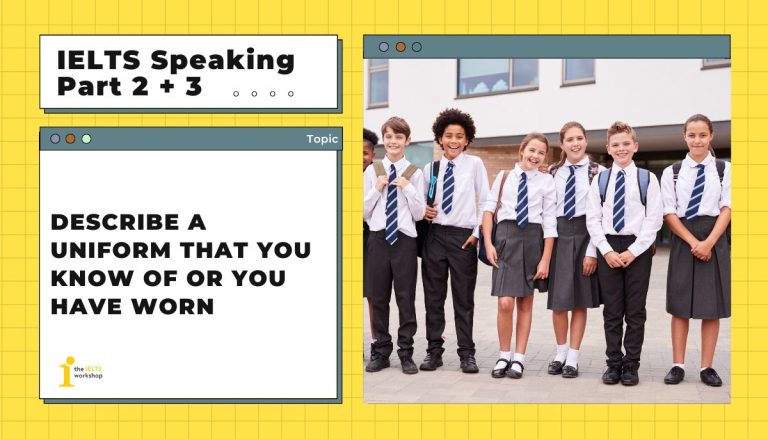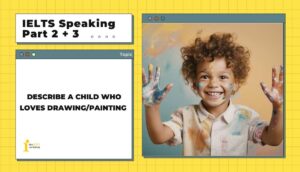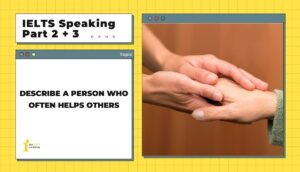Trong bài giải mẫu lần này, cô Mỹ Linh và cô Ngọc Thương của The IELTS Workshop sẽ hướng dẫn bạn trả lời topic “Describe a uniform that you know of or you have worn“ trong IELTS Speaking Part 2. Cùng tham khảo sample, từ vựng và một vài cách diễn đạt ghi điểm trong phần thi IELTS Speaking nhé.
Part 2: Describe a uniform that you know of or you have worn
Describe a uniform that you know of or you have worn
You should say:
What it is like
When you usually wear it
Who bought it for you
And explain how you feel about it
Dưới đây là bài mẫu cho topic “Describe a uniform that you know of or you have worn“.
1. Bài mẫu (Sample)
Sample 1:
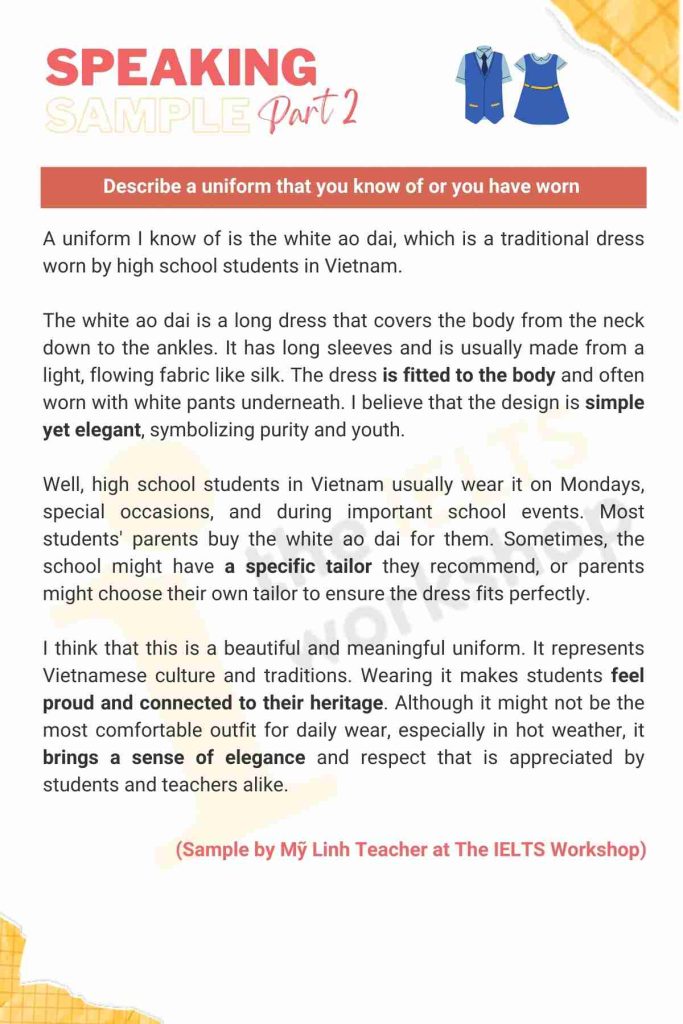
Sample 2:
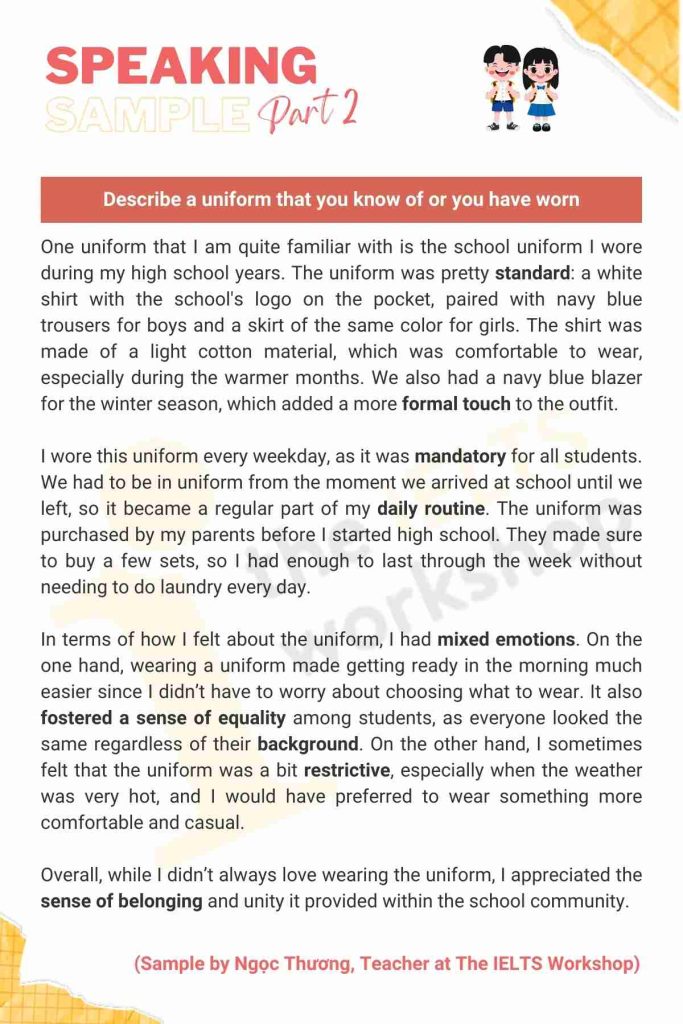
2. Từ vựng (Vocabulary)
Sample 1:
- Be fitted to the body: vừa vặn với vóc dáng cơ thể
- Simple yet elegant: đơn giản nhưng thanh lịch
- A specific tailor: một thợ may riêng
- Feel connected to their heritage: kết nối với di sản văn hóa của đất nước mình
- Bring a sense of elegance: mang lại một cảm giác tao nhã thanh lịch
Sample 2:
- Standard: Tiêu chuẩn
- Mandatory: Bắt buộc
- Formal touch: Sự trang trọng
- Daily routine: Thói quen hàng ngày
- Fostered a sense of equality: Nuôi dưỡng cảm giác bình đẳng
- Background: Hoàn cảnh (gia đình hoặc xã hội)
- Mixed emotions: Cảm xúc lẫn lộn
- Restrictive: Hạn chế
- Sense of belonging: Cảm giác thuộc về
Part 3:
Bên cạnh Part 2, bạn hãy tham khảo thêm Part 3 cho chủ đề này nhé
Why do school students wear a school uniform?
Why don’t teachers wear the same uniforms as their students?
What would you say are the advantages and disadvantages of wearing a school uniform?
What are some examples of occupations that require people to wear a uniform?
Do you feel that uniforms are important?
In your country, do schools provide similar uniforms to their students?
What kinds of professionals need to wear uniforms?
Do you think people wear clothes that reflect their personality?
Do you think women’s clothes show more variety than men’s clothes?
1. Why do school students wear a school uniform?
School students wear uniforms to create a sense of equality and belonging among students. Uniforms reduce distractions related to fashion and help students focus on their studies. They also make it easier to identify students and ensure safety. Additionally, uniforms can promote school pride and a sense of community.
- A sense of equality and belonging: cảm giác về sự bình đẳng và thân thuộc
2. Why don’t teachers wear the same uniforms as their students?
Teachers don’t wear the same uniforms as students because they are not students themselves. They need to dress in a way that is professional and appropriate for their role as educators. Teachers have more freedom in their dress to express their individuality and professionalism. Also, different ahelps distinguish teachers from students.
- Individuality: dấu ấn cá nhân
3. What would you say are the advantages and disadvantages of wearing a school uniform?
Sample 1: The advantages of wearing a school uniform include promoting equality, reducing peer pressure, and enhancing school pride. Uniforms can also simplify getting dressed in the morning and ensure students are dressed appropriately. The disadvantages may include a lack of personal expression and the cost of buying uniforms. Some students might also find uniforms uncomfortable.
- personal expression: sự thể hiện cá tính riêng
Sample 2: Wearing a uniform promotes a sense of equality and reduces social pressure since everyone dresses the same, which can help create a more focused environment. It also saves time in the morning, as there’s no need to decide what to wear. However, uniforms can be uncomfortable, especially if the material isn’t suited to the weather. They can also limit personal expression, as individuals have fewer opportunities to showcase their unique style through clothing.
- Social pressure: Áp lực xã hội
- Personal expression: Sự thể hiện cá nhân
4. What are some examples of occupations that require people to wear a uniform?
Examples of occupations that require uniforms include police officers, nurses, and military personnel. Flight attendants, firefighters, and chefs also wear uniforms. These uniforms help identify the workers and often include practical features for their jobs. Wearing a uniform in these roles can promote professionalism and trust.
- practical features: đặc điểm mang tính ứng dụng cao
- Promote: thúc đẩy
5. Do you feel that uniforms are important?
Yes, I feel that uniforms are important in many situations. They help create a sense of order and professionalism. In schools, uniforms can promote equality and focus on learning. In workplaces, they can enhance safety and team spirit. However, it’s also important to allow some personal expression when possible.
6. In your country, do schools provide similar uniforms to their students?
Yes, in my country, most schools provide similar uniforms for their students. Although the designs and colors might differ from one school to another, they typically follow a standard pattern that reflects the school’s identity. This helps create a unified look among students and reinforces a sense of belonging to the school community. However, some schools might offer slight variations depending on the level of formality they wish to maintain.
- Unified look: Diện mạo đồng nhất
- Sense of belonging: Cảm giác thuộc về
- Level of formality: Mức độ trang trọng
7. What kinds of professionals need to wear uniforms?
Professionals such as police officers, doctors, and airline pilots are required to wear uniforms. These uniforms are essential for maintaining a professional image and ensuring easy identification by the public. In some cases, uniforms also play a functional role, such as providing safety or indicating authority. Uniforms help create a sense of order and trust in professions where public interaction is frequent.
- Public interaction: Sự tương tác với công chúng
- Professional image: Hình ảnh chuyên nghiệp
- Authority: Quyền lực
8. Do you think people wear clothes that reflect their personality?
Yes, I believe people often wear clothes that reflect their personality. Fashion is a powerful form of self-expression, and the choices individuals make in terms of style, color, and accessories often convey something about their character. For example, someone who wears bright, bold colors might be seen as outgoing, while someone who prefers neutral tones might be perceived as more reserved. Clothes can also reflect a person’s mood or lifestyle, making them a significant part of how we present ourselves to the world.
- Self-expression: Sự tự thể hiện
9. Do you think women’s clothes show more variety than men’s clothes?
Yes, women’s clothes typically offer more variety than men’s. Women’s fashion includes a broader range of styles, colors, and designs, allowing for more creativity and expression in dressing. There are more options in terms of cuts, fabrics, and accessories in women’s fashion, compared to the generally more conservative and uniform choices available for men. This variety allows women to express different aspects of their personality or adapt their style to different occasions more easily than men.
- Creativity: Sự sáng tạo
- Conservative: Bảo thủ
- Adapt: Thích nghi
Bài mẫu bởi cô Mỹ Linh va cô Ngọc Thương – Giáo viên The IELTS Workshop
Xem thêm: Describe an occasion you wore the best clothes | IELTS Speaking Part 2+3
Các bạn có thể tham khảo Bộ đề dự đoán IELTS Speaking của The IELTS Workshop để ôn tập những chủ đề mới cho kỳ thi IELTS sắp tới của mình nhé!
Nếu bạn muốn nhận Mentor 1-1 để hoàn thiện kĩ năng Speaking của mình trước khi bước vào kỳ thi, tham khảo ngay Khóa bổ trợ từng kỹ năng IELTS của The IELTS Workshop.


